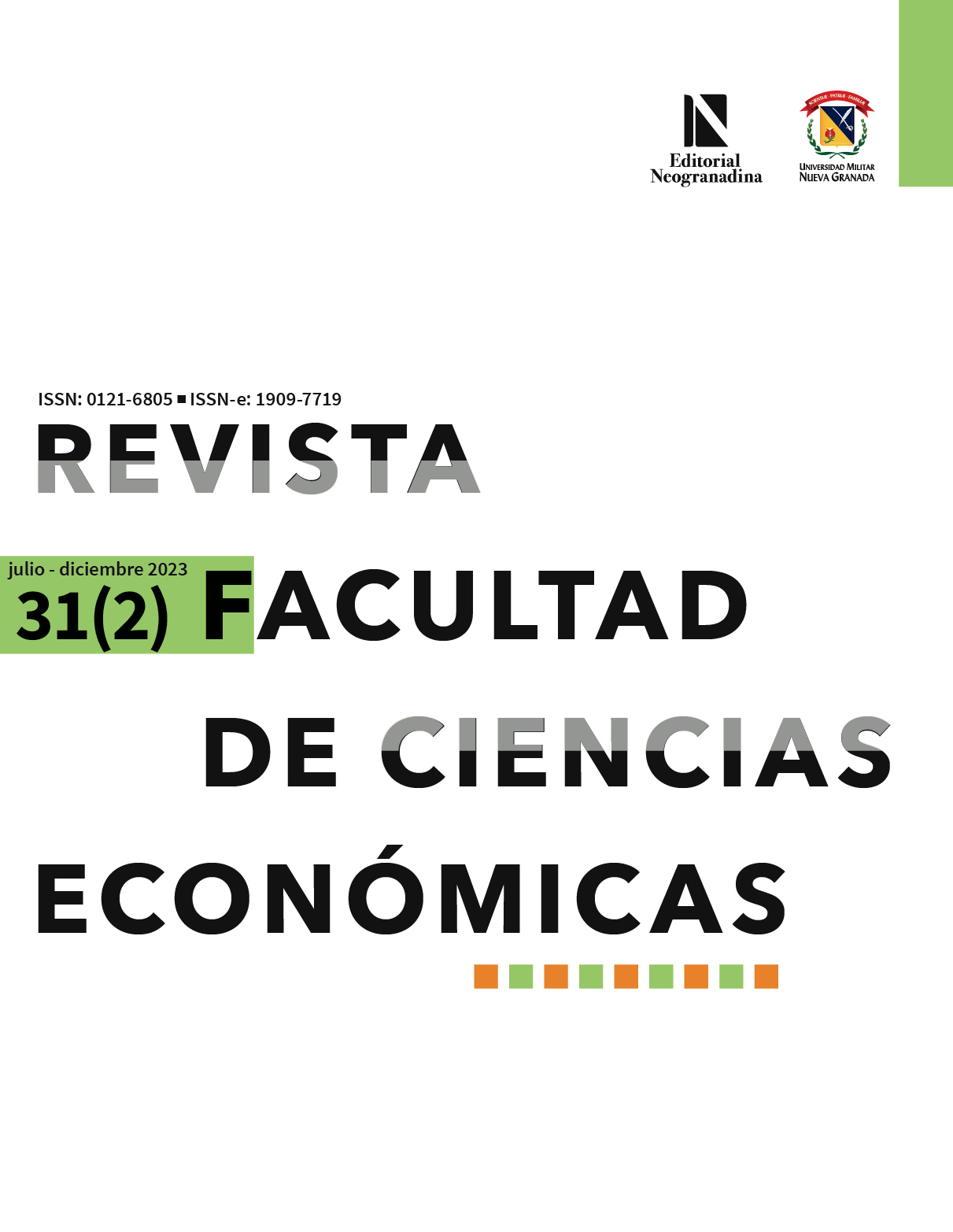El intercambio del conocimiento en una incubadora de empresas con base tecnológica en Ecuador
Resumen
El objetivo de este estudio fue investigar cómo se produce el proceso de intercambio de conocimientos en una incubadora de empresas de base tecnológica. Se trata de una investigación exploratoria-descriptiva, con enfoque cualitativo. El método utilizado fue el estudio de caso. El objeto de estudio fue una incubadora de empresas de base tecnológica ubicada en la provincia de Loja, al sur de Ecuador. Los datos fueron recolectados a partir de entrevistas semiestructuradas realizadas con las empresas incubadas, cuyo guion fue desarrollado a partir de la identificación de elementos de modelos de intercambio de conocimiento encontrados en la literatura consultada. El análisis de los datos se realizó mediante la técnica de análisis de contenido. Los resultados muestran que el intercambio de conocimiento en las incubadoras de empresas de base tecnológica se da en función de la presencia de las siguientes variables: conocimiento, fuente de conocimiento, destinatario, contexto y canal. Los factores que influyen en este proceso son las alianzas establecidas por las empresas incubadas y la incubadora, con énfasis en las instituciones de enseñanza e investigación; las interacciones en la incubadora y las motivaciones relacionadas con la búsqueda de innovación; los entornos que utilizan las empresas incubadas para realizar sus interacciones y compartir información, y los conocimientos compartidos por las empresas incubadas, que en su mayoría están relacionados con el desarrollo de los negocios de las empresas incubadas.
Descargas
Referencias bibliográficas
Al Hawamdeh, N. (2021). Revisiting the entrepreneurial ventures through the adoption of business incubators by higher education institutions. The International Journal of Management Education, 19(1), 100419. https://doi.org/10.1016/j.ijme.2020.100419.
Al Mubaraki, H., y Busler, M. (2012). Middle East towards incubator benefits: Case studies. International Journal of Economics and Management Engineering, 6(3), 344-347.https://publications.waset.org/1825/middle-east-towards-incubator-benefits-case-studies.
Alavi, M. A. (2001). The Effect of Strategic Orientation on Organizational Performance: The Mediating Role of Innovation. MIS Quarterly, 25(1), 107-136.https://doi.org/10.4236/ijcns.2016.911039.
Ali, S. N., y Nazmi, D. O. (2023). The role of business incubators in supporting and developing the international competitiveness of small projects in Iraq. Materials Today: Proceedings, 80, 3111-3118. https://doi.org/10.1016/j.matpr.2021.07.174.
Allen, T. J., Gloor, P., Fronzetti Colladon, A., Woerner, S. L., y Raz, O. (2016). The power of reciprocal knowledge sharing relationships for startup success. Journal of Small Business and Enterprise Development, 23(3), 636-651.https://doi.org/10.1108/JSBED-08-2015-0110
Ancona, D. G., y Caldwell, D. F. (1992). Bridging the boundary: external activity and performance in organizational teams. Administrative Science Quarterly, 37(4), 634-666.https://doi.org/10.2307/2393475.
Ardichvili, A. (2008). Learning and knowledge sharing in virtual communities of practice: motivators, barriers, and enablers. Advances in Developing Human Resources, 10(4), 541-554.https://doi.org/10.1177/1523422308319.
Associação Nacional de Entidades Promotoras de Empreendimentos Inovadores. Mecanismo de geração de empreendimentos e ecossistemas de inovação. 2020.http://www.anprotec.org.br/.
Bardin, L. (2011). Análise de conteúdo. Edições 70.
Binsawad, M., Sohaib, O., y Hawryszkiewycz, I. (2019). Factors impacting technology business incubator performance. International Journal of Innovation Management, 23(1), 1-30.https://doi.org/10.1142/S1363919619500075.
Blackburne, G. D., y Buckley, P. J. (2019). The international business incubator as a foreign market entry mode. Long Range Planning, 52(1), 32-50.https://doi.org/10.1016/j.lrp.2017.10.005.
Bock, G. W., Zmud, R. W., Kim, Y. G., y Lee, J. N. (2005). Behavioral intention formation in knowledge sharing: Examining the roles of extrinsic motivators, social-psychological forces, and organizational climate. MIS Quarterly, 29(1), 87-111.https://doi.org/10.2307/25148669.
Brachos, D., Kostopoulos, K., Eric Soderquist, K., y Prastacos, G. (2007). Knowledge effectiveness, social context and innovation. Journal of knowledge management, 11(5), 31-44.https://doi.org/10.1108/13673270710819780
Cabrera, A., Collins, W. C., y Salgado, J. F. (2006). Determinants of individual engagement in knowledge sharing. The International Journal of Human Resource Management, 17(2), 245-264.https://doi.org/10.1080/09585190500404614.
Caires, R. T., y Pereira, M. F. (2020). Vantagens e Barreiras da Metodologia Lean Startup para Empresas de Base Tecnológica em Habitats de Inovação. Cadernos de Prospecção, 13(4), 1036-1052. https://doi.org/10.9771/cp.v13i4.32850.
Camelo-Ordaz, C., Garcia-Cruz, J., Sousa-Ginel, E., y Valle-Cabrera, R. (2011). The influence of human resource management on knowledge sharing and innovation in Spain: the mediating role of affective commitment. The International Journal of Human Resource Management, 22(7), 1442-1463. https://doi.org/10.1080/09585192.2011.561960.
Collins, C. J., y Smith, K. G. (2006). Knowledge Exchange and Combination: The Role of Human Resource Practices in the Performance of High-Technology Firms. Academy of Management Journal, 49(3), 544-560. https://doi.org/10.5465/amj.2006.21794671.
Cyr, S., y Choo, C. W. (2010). The individual and social dynamics of knowledge sharing: an exploratory study. Journal of Documentation, 66(6), 824-846.https://doi.org/10.1108/00220411011087832.
Davenport, T.H., y Prusak, L. (1998). Conhecimento Empresarial. Campus.
De Bem Machado, A., Silva, A. R. L., y Catapan, A. H. (2016). Bibliometria sobre concepção de habitats de inovação. Navus-Revista de Gestão e Tecnologia, 6(3), 88-96.https://www.redalyc.org/pdf/3504/350454047006.pdf.
Del Sarto, N., Isabelle, D. A., y Di Minin, A. (2020). The role of accelerators in firm survival: An fsQCA analysis of Italian startups. Technovation, 90(1), 1-13.https://doi.org/10.1016/j.technovation.2019.102102.
Farooq, R. (2018). A conceptual model of knowledge sharing. International Journal of Innovation Science, 10(2), 238-260.https://doi.org/10.1108/IJIS-09-2017-0087
Fernández Fernández, M. T., Blanco Jiménez, F. J., y Cuadrado Roura, J. R. (2015). Business incubation: innovative services in an entrepreneurship ecosystem. The Service Industries Journal, 35(14), 783-800.https://doi.org/10.1080/02642069.2015.1080243.
Ferreira, M. C. Z., y Teixeira, C. S. (2016). Terminologia de habitats de inovação: Alinhamento conceitual. Florianópolis: Perse. 2016. 51p. E-book. http://via.ufsc.br/wp-content/uploads/2018/04/terminologia-de-habitats-de-inovacao.pdf.
Filieri, R., y Alguezaui, S. (2014). Structural social capital and innovation. Is knowledge transfer the missing link?. Journal of knowledge management, 18(4), 728-757.https://doi.org/10.1108/JKM-08-2013-0329.
Fu, N., Flood, P. C., Bosak, J., Morris, T., y O'Regan, P. (2015). How do high performance work systems influence organizational innovation in professional service firms? Employee Relations, 37(2), 209-331. https://doi.org/10.1108/ER-10-2013-0155.
Gao, Q., Cui, L., Lew, Y. K., Li, Z., y Khan, Z. (2021). Business incubators as international knowledge intermediaries: Exploring their role in the internationalization of start-ups from an emerging market. Journal of International Management, 27(4), 100861.https://doi.org/10.1016/j.intman.2021.100861.
International Business Incubation Association. Inbia (2017). Operational Definitions: Entrepreneurship Centers (Incubators, Accelerators, Coworking Spaces and Other Entrepreneurial Support Organizations). https://inbia.org/wp-content/uploads/2016/09/InBIA-Industry-Terms.pdf?x84587.
Ipe, M. (2003). Knowledge sharing in organizations: A conceptual framework. Human Resource Development Review, 2(4), 337- 359.https://doi.org/10.1177/1534484303257985
Jin-Chang, T., Pao-Yeh, S., y Yeh, I. J. (2007). The effects of joint reward system in new product development. International Journal of Manpower, 28(3/4), 276-297.https://doi.org/10.1108/01437720710755254.
Kim, S., y Lee, H. (2006). The Impact of Organizational Context and Information Technology on Employee Knowledge-Sharing Capabilities. Public Administration Review, 66(3), 370-385.https://doi.org/10.1111/j.1540-6210.2006.00595.x.
Klofsten, M., Lundmark, E., Wennberg, K., y Bank, N. (2020). Incubator specialization and size: Divergent paths towards operational scale. Technological Forecasting and Social Change, 151, 119821. https://doi.org/10.1016/j.techfore.2019.119821.
Laily, N., y Ernawati, D. P. (2020). The effect of knowledge sharing and innovation behavior on the performance of batik entrepreneurs. Jurnal Manajemen, Jawa Barat, 24(2), 194-209.https://doi.org/10.24912/jm.v24i2.643.
Lee, C. K., y Al-Hawamdeh, S. (2002). Factors Impacting Knowledge Sharing. Journal of Information y Knowledge Management, 1(1), 49-56.https://doi.org/10.1142/S0219649202000169.
Lee, D., y Ahn, J. (2007). Reward system for intra-organizational knowledge sharing. European Journal of Operational Research, 180(2), 938-956.https://doi.org/10.1016/j.ejor.2006.03.052.
Lee, H., y Choi, B. (2003). Knowledge Management Enablers, Processes, and Organizational Performance: An Integrative View and Empirical Examination. Journal of Management Information Systems, 20(1), 179-228.https://doi.org/10.1080/07421222.2003.11045756.
Lin, H. F. (2007). Effects of extrinsic and intrinsic motivation on employee knowledge sharing intentions. Journal of Information Science, 33(2), 135-149.https://doi.org/10.1177/0165551506068.
Lin, H., y Lee, G. (2006). Effects of socio-technical factors on organizational intention to encourage knowledge sharing. Management Decisions, 44(1), 74-88.https://doi.org/10.1108/00251740610641472.
Lovelace, K., y Weingart, D. L. (2017). Maximizing Cross-Functional New Product Teams' Innovativeness and Constraint Adherence: A Conflict Communications Perspective. Academy of Management Journal, 44(4), 779-793.https://doi.org/10.5465/3069415.
Lukeš, M., Longo, M. C., y Zouhar, J. (2019). Do business incubators really enhance entrepreneurial growth? Evidence from a large sample of innovative Italian start-ups. Technovation,82, 25-34. https://doi.org/10.1016/j.technovation.2018.07.008.
Magd, H., y Gharib, A. (2021). Entrepreneurship and SMEs Sustainable Development through Business Incubators: The case of Oman. Scientific Journal for Financial and Commercial Studies and Researches, 2(2), 191-220.https://doi.org/10.21608/cfdj.2021.146717.
Malekzadeh, G., Khorakian, A., y Malekzadeh, M. A. (2020). Proposing a model for work meaningfulness concept at business and technology incubators. Middle East Journal of Management, 7(3), 207-225. https://doi.org/10.1504/MEJM.2020.107100.
Mas-Verdú, F., Ribeiro-Soriano, D., y Roig-Tierno, N. (2015). Firm survival: The role of incubators and business characteristics. Journal of Business Research, 68(4), 793-796.https://doi.org/10.1016/j.jbusres.2014.11.030.
Meyer, J.P., y Allen, N. J. (1997). Commitment in the workplace. Theory, research and application. Sage.https://doi.org/10.4135/9781452231556
Molina, L., y Llorens-Montes, F. C. (2006). Autonomy and teamwork effect on knowledge transfer: knowledge transferability and moderator variable. International Journal of Technology Transfer y Commercialisation, 5(3), 263-285. https://doi.org/10.1504/IJTTC.2006.010753.
Nirawati, L., y Prayogo, R. R. (2019). The triangle of knowledge sharing, e-marketing capability, marketing performance. JEMA: Jurnal Ilmiah Bidang Akuntansi dan Manajemen, 33(22), 22-33. https://core.ac.uk/download/pdf/229608137.pdf.
Nishimoto, K., y Matsuda, K. (2007). Informal Communication Support Media for Encouraging Knowledge-Sharing and Creation in a Community. International Journal of Information Technology y Decision Making, 6(3), 411-426.https://doi.org/10.1142/S0219622007002551.
Nonaka, I., y Takeuchi, H. (1995). The Knowledge-creating Company: How Japanese Companies Create the Dynamics of Innovation. Oxford University Press.https://doi.org/10.1093/oso/9780195092691.001.0001
Obrenovic, B. et al. (2020). The enjoyment of knowledge sharing: Impact of altruism on tacit knowledge-sharing behavior. Frontiers in Psychology, Lausanne, 11(1), 1-16.https://doi.org/10.3389/fpsyg.2020.01496.
Owda, M. O., Owda, R. O., Abed, M. N., Abdalmenem, S. A., Abu-Naser, S. S., y Al Shobaki, M. J. (2019). Personal Variables and Their Impact on Promoting Job Creation in Gaza Strip through Business Incubators. International Journal of Academic Accounting, Finance y Management Research, 3(8), 65-77.http://dstore.alazhar.edu.ps/xmlui/handle/123456789/469.
Özdemir, Ö. Ç., y Şehitoğlu, Y. (2013). Assessing the Impacts of technology business incubators: A framework for technology development centres in Turkey. Procedia Social and Behavioral Sciences, 75(1), 282-291.https://doi.org/10.1016/j.sbspro.2013.04.032.
Paoloni, P., y Modaffari, G. (2022). Business incubators vs start-ups: a sustainable way of sharing knowledge. Journal of Knowledge Management, 26(5), 1235-1261.https://doi.org/10.1108/JKM-12-2020-0923
Penagos, C. O. P., Albarracín, J. A. B., y Gómez, T. P. S. (2018). Vigencia conceptual de los factores de la motivación: una perspectiva desde la teoría bifactorial propuesta por Hezberg. Cuadernos Latinoamericanos de Administración, 14(27), 25-52. https://www.redalyc.org/journal/4096/409658132008/movil/. https://doi.org/10.18270/cuaderlam.v14i27.2467
Rahman, S., Islam, M. Z., y Abdullah, A. D. A. (2017). Understanding factors affecting knowledge sharing: A proposed framework for Bangladesh's business organizations. Journal of Science and Technology Policy Management, 8(3), 275-298. https://doi.org/10.1108/JSTPM-02-2017-0004.
Ratinho, T., Harms, R., y Groen, A. J. (2009). Technology business incubators as engines of growth: towards a distinction between technology incubators and non-technology incubators. Entrepreneurship and Small Business, 1-19. https://mdsoar.org/handle/11603/5397.
Raupp, F., y Beuren, I. (2020). Compartilhamento do conhecimento em incubadoras brasileiras associadas à ANPROTEC. Revista de Administração Mackenzie, 8(1), 38-59. https://doi.org/10.1590/1678-69712007/administracao.v8n2p38-58.
Rezaee, B., Angizan, S. D., y Hosseiny, D. (2018). Exploring the Barriers to the Development of Agricultural Businesses in technology Incubators: A case Study of razi university Incubator, Iran. International Journal of Agricultural Management and Development, 8(2), 193-199. https://doi.org/10.22004/ag.econ.292531.
Riege, A. (2005). Three-dozen knowledge-sharing barriers managers must consider. Journal of Knowledge Management, 9(3), 18-35.https://doi.org/10.1108/13673270510602746.
Roberts, J. (2000). From know-how to show-how? Questioning the role of information and communication technologies in knowledge transfer. Technology analysis y Strategic Management, 12(4), 429-443. https://doi.org/10.1080/713698499.
Robertson, M., y Hammersley, G. O. (2000). Knowledge management practices within a knowledge-intensive firm: The significance of the people management dimension. Journal of European Industrial Training, 24(2/3/4), 241-253.https://doi.org/10.1108/03090590010321205.
Ruppel, C., y Harrington, S. J. (2000). The relationship of communication, ethical work climate, and trust to commitment and innovation. Journal of Business Ethics, 25(4), 313-328.https://doi.org/10.1023/A:1006290432594.
Sampieri, R. H., Collado, C. F., y Lucio, P. B. (2013). Metodologia de Pesquisa (5ta ed.). Penso.
Scarabelli, B. H., Sartori, R., y Da Cruza Urpia, A. G. B. (2022). Compartilhamento do conhecimento em ambientes de inovação: um estudo em uma incubadora de empresas de base tecnológica. Em Questão, 28(3), 1-30.https://doi.org/10.19132/1808-5245283.118605.
Schmitz, A., Urbano, D., Dandolini, G. A., de Souza, J. A., y Guerrero, M. (2017). Innovation and entrepreneurship in the academic setting: a systematic literature review. International Entrepreneurship and Management Journal, 13(2), 369-395.https://doi.org/10.1007/s11365-016-0401-z
Siemsen, E., Roth, A. V., y Balasubramanian, S. (2008). How motivation, opportunity, and ability drive knowledge sharing: The constraining-factor model. Journal of Operations Management, 26(3), 426-445. https://doi.org/10.1016/j.jom.2007.09.001.
Sudibjo, N.; Prameswari, R. K. (2021). The effects of knowledge sharing and person-organization fit on the relationship between transformational leadership on innovative work behavior. Heliyon, 7(1), e07334.https://doi.org/10.1016/j.heliyon.2021.e07334.
Sukhur, S. S., y Abu Bakar, S. (2018). Factors contributing to the incubation performance of Malaysian technology incubators. Economic and Technology Management Review, 13(1), 33-43. http://myagric.upm.edu.my/id/eprint/17590/.
Swan, J., Newell, S., Scarbrough, H., y Hislop, D. (1999). Knowledge management and innovation: networks and networking. Journal of Knowledge management, 3(4), 262-275. https://doi.org/10.1108/13673279910304014.
Tonet, H. C., y Paz, M. G. T. (2006). Um modelo para o compartilhamento de conhecimento no trabalho. Revista de Administração Contemporânea, 10(2), 75-94.https://doi.org/10.1590/S1415-65552006000200005
Van Den Hooff, B., y Van Weenen, F. D. L. (2004). Committed to share: The relationship between organizational commitment, knowledge sharing and the use of CMC. Knowledge and Process Management, 11(1), 13-24. https://warwick.ac.uk/fac/soc/wbs/conf/olkc/archive/oklc4/papers/oklc2003_van_den_hooff.pdf.DOI: https://doi.org/10.1002/kpm.187
Wang, S., y Noe, R. A. (2010). Knowledge sharing: A review and directions for future research. Human Resource Management Review, 20(2), 115-131. https://doi.org/10.1016/j.hrmr.2009.10.001.
Wang, Z., He, Q., Xia, S., Sarpong, D., Xiong, A., y Maas, G. (2020). Capacities of business incubator and regional innovation performance. Technological Forecasting and Social Change,158, 120-125. https://doi.org/10.1016/j.techfore.2020.120125.
Wilson, J. M., Goodman, P. S., y Cronun, M. A. (2007). Group learning. Academy of Management Review, 32(4), 1041-1059. https://doi.org/10.5465/amr.2007.26585724.
Wolfe, C., y Loraas, T. (2008). Knowledge Sharing: The Effects of Incentives, Environment, and Person. Journal of Information Systems, 22(2), 53-76.https://doi.org/10.2308/jis.2008.22.2.53.
Wonglimpiyarat, J. (2016). The innovation incubator, university business incubator and technology transfer strategy: The case of Thailand. Technology in Society, 46(1), 18-27. https://doi.org/10.1016/j.techsoc.2016.04.002.
Wu, W., y Lee, Y. (2020). Do work engagement and transformational leadership facilitate knowledge sharing? A perspective of conservation of resources theory. International Journal of Environmental Research and Public Health, 17(7), 2615.https://doi.org/10.3390/ijerph17072615.
Zhang, X-B., Lin, C-H., Chung, K-C., Tsau, F-S., y Wu, R-T. (2019). Knowledge sharing and co-opetition: Turning absorptive capacity into effectiveness in consumer electronics industries. Sustainability, Basel, 11(17), 4694. https://doi.org/10.3390/su11174694.
Zárraga, O., y Bonache, P. (2010). Equipos de trabajo para la gestión del conocimiento: la importancia de un clima adecuado. Cuadernos de Economía y Dirección de la Empresa, 22(1), 27-48. https://dialnet.unirioja.es/servlet/articulo?codigo=2162906
Zhu, C., Qiu, Z., y Liu, F. (2021). Does innovation stimulate employment? Evidence from China. Economic Modelling, 94(1), 1007-1017.https://doi.org/10.1016/j.econmod.2020.02.041.
Zibarzani, M., y Abd Rozan, M. Z. (2018). The Role of Knowledge Sharing in Business Incubators Performance. International Conference of Reliable Information and Communication Technology. Springer, Cham, 719-727.https://doi.org/10.1007/978-3-319-59427-9_74.

Datos de los fondos
Derechos de autor 2023 Revista Facultad de Ciencias Económicas

Esta obra está bajo una licencia internacional Creative Commons Atribución-NoComercial-SinDerivadas 4.0.











